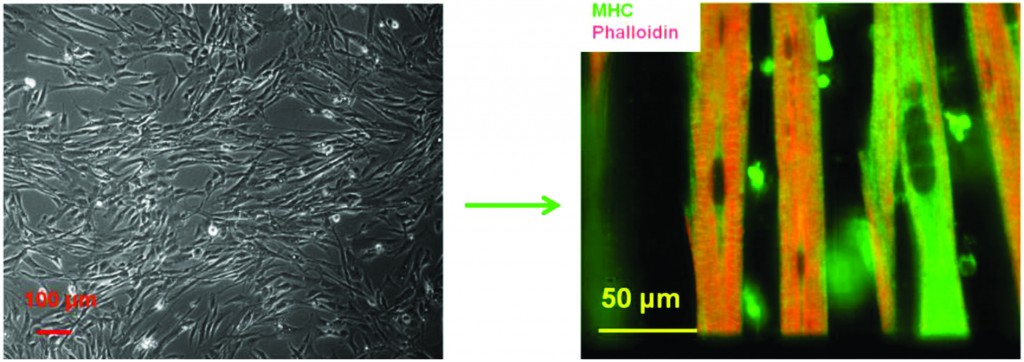Hickman et al. have developed methods to successfully differentiate human muscle progenitor cells into functional, multinucleated myofibers.
The first step towards replacing muscle lost due to diseases such as muscular dystrophy is to build functional model systems of healthy muscle tissue. In order to do this with human cells, human muscle progenitor cells must be removed from the body, cultured in a dish, and treated with appropriate signaling molecules in order to appropriately differentiate into functional muscle fibers, known as myotubes or myofibers. Hickman et al. have done precisely this – the authors demonstrate that it is possible to differentiate muscle progenitor cells into human myofibers outside of the body. These myofibers are also shown to contract both in response to external electrical stimulation as well as spontaneously.
The researchers developed a special media cocktail that allowed these myofibers to grow in culture over a period of more than two weeks. Importantly, the media cocktail did not contain serum, an undefined extract from animal blood that is often used to keep grow cells in culture outside of the body. This has important implications for eventual clinical translation. The researchers found that their differentiation medium produced myofibers that contained organized sarcomeres (the internal cell machinery that allows fibers to contract and do work). Muscle contraction generally occurs through the uptake of calcium by the cells from their surroundings. Calcium uptake requires the presence of two different types of calcium channels, DHPR and RyR. The researchers generated myofibers that demonstrated the presence of both of these channels. Finally, these myofibers also contracted on their own, as well as in response to an applied electrical potential.
This research marks an important step forward in muscle development research, and can be found here.
Spontaneous contraction of human myotubes in culture
In vitro differentiation of functional human skeletal myotubes in a defined system
Xiufang Guo, Keshel Greene, Nesar Akanda, Alec S. T. Smith, Maria Stancescu, Stephen Lambert, Herman Vandenburgh and James J. Hickman
Biomater. Sci., 2013, Advance Article DOI: 10.1039/C3BM60166H
Debanti Sengupta recently completed her PhD in Chemistry from Stanford University. She is currently a Siebel postdoctoral scholar at the University of California, Berkeley.
Follow the latest journal news on Twitter @BioMaterSci or go to our Facebook page.
To keep up-to-date with all the latest research, sign-up to our RSS feed or Table of contents alert.











